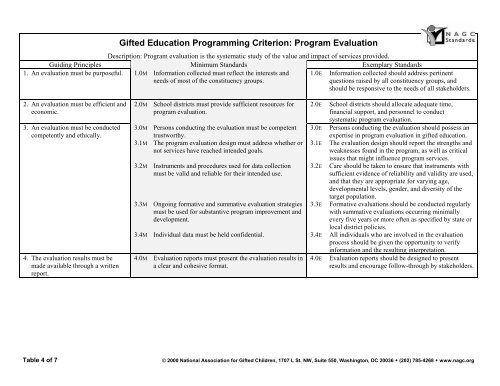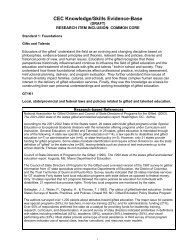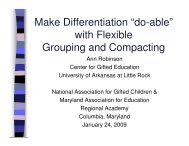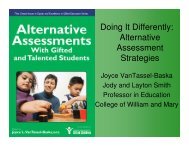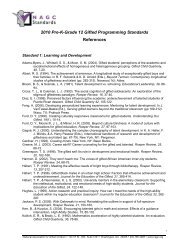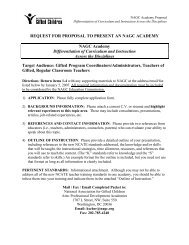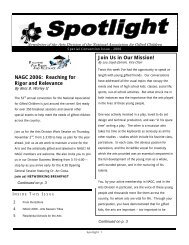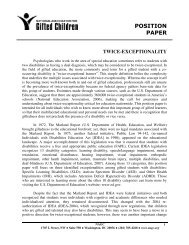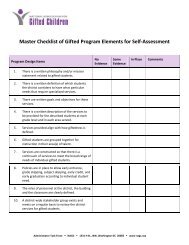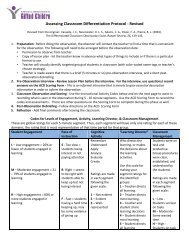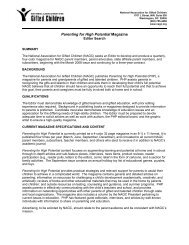Pre-K–Grade 12 Gifted Program Standards - NAGC
Pre-K–Grade 12 Gifted Program Standards - NAGC
Pre-K–Grade 12 Gifted Program Standards - NAGC
Create successful ePaper yourself
Turn your PDF publications into a flip-book with our unique Google optimized e-Paper software.
<strong>Gifted</strong> Education <strong>Program</strong>ming Criterion: <strong>Program</strong> Evaluation<br />
Description: <strong>Program</strong> evaluation is the systematic study of the value and impact of services provided.<br />
Guiding Principles Minimum <strong>Standards</strong> Exemplary <strong>Standards</strong><br />
1. An evaluation must be purposeful. 1.0M Information collected must reflect the interests and 1.0E Information collected should address pertinent<br />
needs of most of the constituency groups.<br />
questions raised by all constituency groups, and<br />
should be responsive to the needs of all stakeholders.<br />
2. An evaluation must be efficient and<br />
economic.<br />
3. An evaluation must be conducted<br />
competently and ethically.<br />
4. The evaluation results must be<br />
made available through a written<br />
report.<br />
2.0M School districts must provide sufficient resources for<br />
program evaluation.<br />
3.0M Persons conducting the evaluation must be competent<br />
trustworthy.<br />
3.1M The program evaluation design must address whether or<br />
not services have reached intended goals.<br />
3.2M Instruments and procedures used for data collection<br />
must be valid and reliable for their intended use.<br />
3.3M Ongoing formative and summative evaluation strategies<br />
must be used for substantive program improvement and<br />
development.<br />
3.4M Individual data must be held confidential.<br />
4.0M Evaluation reports must present the evaluation results in<br />
a clear and cohesive format.<br />
2.0E School districts should allocate adequate time,<br />
financial support, and personnel to conduct<br />
systematic program evaluation.<br />
3.0E Persons conducting the evaluation should possess an<br />
expertise in program evaluation in gifted education.<br />
3.1E The evaluation design should report the strengths and<br />
weaknesses found in the program, as well as critical<br />
issues that might influence program services.<br />
3.2E Care should be taken to ensure that instruments with<br />
sufficient evidence of reliability and validity are used,<br />
and that they are appropriate for varying age,<br />
developmental levels, gender, and diversity of the<br />
target population.<br />
3.3E Formative evaluations should be conducted regularly<br />
with summative evaluations occurring minimally<br />
every five years or more often as specified by state or<br />
local district policies.<br />
3.4E All individuals who are involved in the evaluation<br />
process should be given the opportunity to verify<br />
information and the resulting interpretation.<br />
4.0E Evaluation reports should be designed to present<br />
results and encourage follow-through by stakeholders.<br />
Table 4 of 7 © 2000 National Association for <strong>Gifted</strong> Children, 1707 L St. NW, Suite 550, Washington, DC 20036 (202) 785-4268 www.nagc.org


